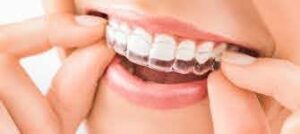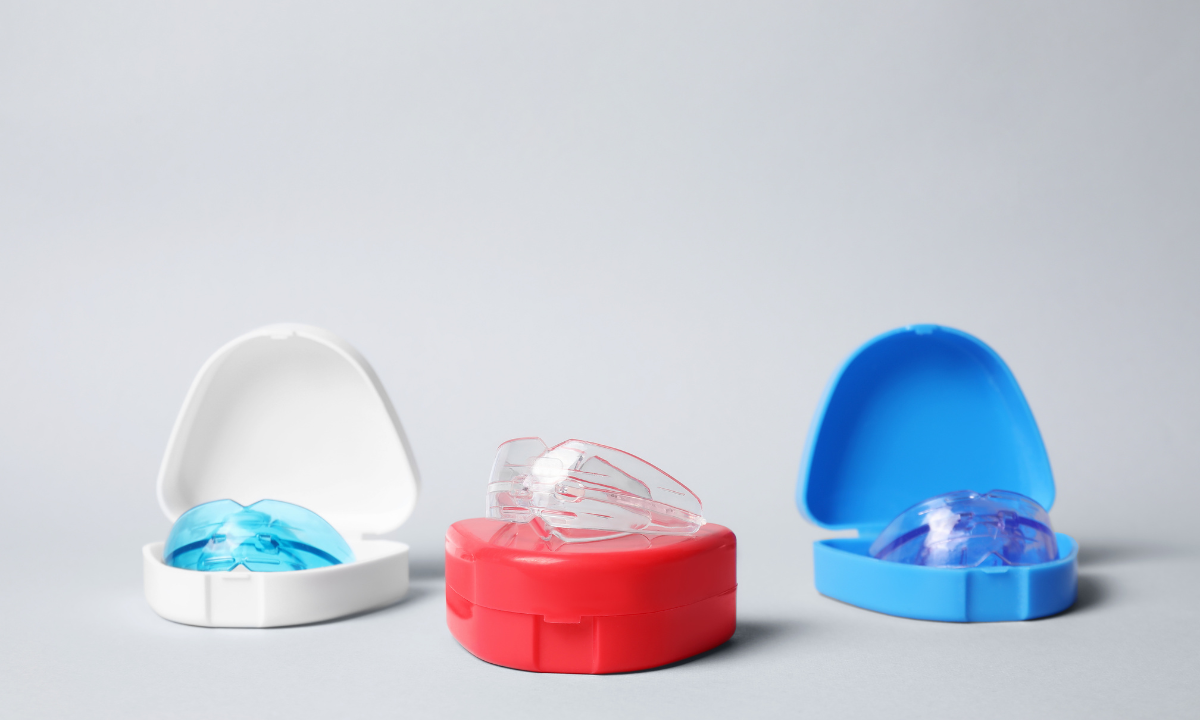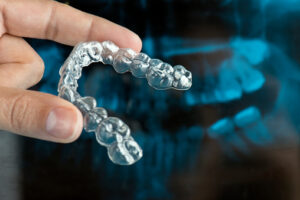Are you struggling with teeth grinding or bruxusm at night? Are other activities such as sports affecting your teeth? Learn more about the different types of mouth guards that can help.
How mouth guards can prevent sleep bruxism?
In simple terms, it’s clenching and grinding your teeth while you sleep. Experts estimate that bruxism affects up to 50% of children, 15% of adolescents, and 8% of adults.
Over time, bruxism can lead to tension headaches and tooth damage. The good news is there’s a simple solution for teeth grinding and common conditions like snoring and sleep apnea.
In this post, we’ll discuss different types of mouth guards and what they’re used for. We’ll also tell you where to get one and how to properly care for it. Keep reading to learn more!
Do I Need a Mouth Guard?
If you think mouth guards are only for professional athletes, think again. Here are 4 ways a mouth guard can make a world of difference in your daily life.
1. Teeth Grinding
As we mentioned earlier, clenching and grinding is a common problem for children and adults. Many people aren’t even aware they have the problem until they wake up with headache or damage their teeth.
A mouth guard for sleeping creates a layer of protection between your top and bottom teeth. It helps your jaw muscles to relax and prevents damage to your teeth and gums. A visit to your pediatric dentist or nearest dental clinic can help you know more.
2. Sleep Apnea
Sleep apnea is a disorder that causes you to temporarily stop breathing while you sleep. The lack of oxygen will leave you feeling groggy the next day, and over time, increase your risk of stroke and heart disease.
People with severe sleep apnea usually require a CPAP machine to keep their airways clear while they sleep. For people with milder sleep apnea, a specialized mouth guard can do the same thing.
The mouth guard for sleeping pushes your tongue and lower jaw forward, ensuring your breathing doesn’t get interrupted during the night. Keep in mind that you’ll need to get this type of nightguard from a medical professional—the ones they sell at the store won’t work for sleep apnea.
3. Snoring
Sleep experts believe that 40% of men and 24% of women are habitual snorers. Snoring is the result of the soft tissues in the back of your throat vibrating as you breathe.
How can a night mouth guard help with snoring? Like the night guard for sleep apnea, these types of mouth guards keep your airways open by gently pulling your lower forward. This can reduce or even eliminate the problem of snoring.
Mouth guards protect your teeth from injures while playing sports
If you or your children are involved in certain types of sports, it’s worth considering a mouth guard for protection. In the event of a fall or facial trauma, a mouth guard will reduce the chance of damaging your teeth, gums, and jaw.
Mouth guards are a good idea if you play team sports such as field hockey, soccer, and basketball. They’re essential for close contact sports like wrestling, martial arts, or boxing.
Different Types of Mouth Guards
Now that you know the different uses for mouth guards, let’s talk about your options for buying one.
Types of mouth guards
1. Stock mouth guards
Stock mouth guards are widely available and easily affordable. You can pick one up from a drug store, pharmacy, or sporting goods store. They come in general sizes (small, medium, or large) and fit over your top teeth.
Although stock guards are an easy option, they also have their drawbacks. Because they’re not customized for your mouth, it’s unlikely that they’ll fit well. You might have some discomfort from certain parts of the guard being too large or too small for your mouth.
Because it’s not a tight fit, you might also have difficulty talking while wearing it.
2. Boil-and-Bite Mouth Guards
The next step up is a boil-and-bite mouth guard, which you can also buy at a pharmacy or drugstore. Rather than a variety of sizes, these types of mouth guards come in one standard size that you customize to fit your teeth.
3. Braces mouth guards
The injury that can occur during Orthodontic treatment can be greater. The Orthodontic braces have metal or ceramic brackets that might impinge on the soft tissues causing lacerations. Your Orthodontist can fabricate these mouth guard to avoid any such unforeseen injuries during Orthodontic treatment. Invisalign can go a long way in preventing these injuries as it is a clear aligner without sharp brackets or wires.
Individual instructions vary, but typically you’ll drop the mouth guard into boiling water for a few minutes. Once the plastic has softened, you’ll insert it into your mouth and bite down until it molds to your teeth.
These provide a more comfortable fit and feel than stock guards, although it’s still unlikely to be a 100% perfect fit. It will also become weak and need replacing over time, especially if you wear it every night.
4. Pediatric dental mouth guards
These are custom made for kids by pediatric dentists. The kids can choose their favourite colours or print on them.
Custom Mouth Guards
If you’re serious about protecting your teeth and improving your sleep, your best bet is to visit your dentist and ask about a custom mouth guard. Dentists usually create a mold of your mouth and then craft a guard that’s perfectly suited for your teeth.
What if you’re unsure whether a mouth guard is the solution you’re looking for? Start with a stock guard or boil-and-bite guard and try it for a few nights.
If you notice an improvement, talk to your dentist about creating a custom mouth guard you can use for years to come. Kids especially might need custom made mouth guards as their dental arch is smaller in size which can be fabricated by a pediatric dentist.
Taking Care of Your Mouth Guard
To keep your mouth guard in good shape, you’ll need to rinse it with cool water or mouthwash after each use. Avoid hot water, as this could warp its shape.
Treat it as an extension of your mouth and clean it with your toothbrush and toothpaste. Check it for holes or other signs of wear and tear, which might mean it’s time for a new one.
When you’re not wearing it, store it in a hard, ventilated container away from children and pets. Bring it with you whenever you have a dental appointment to ensure it still fits properly.
Dental Mouth Guards

As you can see, mouth guards area multi-functional tool that can solve a variety of problems.
Mouth guards are ideal for anyone who grinds their teeth at night or plays contact sports. They can also help with snoring and sleep apnea.
Although there are some ready-made mouth guard options at the store, your best bet is to visit your dentist and get a custom design. Not only will it be more comfortable for you, but you’ll know you have exactly the type you need to best suit your needs.
Do you have more questions about mouth guards, orthodontics, or general dentistry? Contact us today and we’ll gladly provide the answers.




